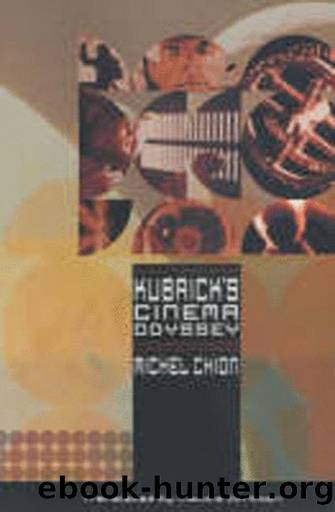Kubrick's Cinema Odyssey by Michel Chion

Author:Michel Chion [Chion, Michel]
Language: eng
Format: epub
Tags: Performing Arts, Film, Direction & Production, General
ISBN: 9781838716646
Google: iQn8DwAAQBAJ
Publisher: Bloomsbury Publishing
Published: 2019-07-25T23:26:29.761110+00:00
Chapter Five
Towards the Absolute Film
Commutation
Let us revisit the first two appearances of the monolith. The final images of these two scenes, with the sound that accompanies them (in âThe Dawn of Manâ, a high chord of the Ligeti music, and in the scene on the moon, a very high strident tone), show us the object from a low angle, so that it cuts into the sky; both scenes end abruptly, even brutally, with simultaneous cuts on image and music. The monolith thus becomes associated with the idea of interruption, of immediate obliteration â of commutation.1
Commutation essentially means that where there was nothing, suddenly there is something, but this something can itself disappear in an instant. This has been the case for a century with lighting by electric bulbs, unlike the lights that came before â candles, oil or gas.
It is a similar story for sound. With the tube amplifier, the sound gradually increased in intensity; with transistor amps beginning in the 50s, sound comes instantaneously, so that when you turn on the dial or press the button, you get music at once.
The ever-increasing speed of modern computers is having the effect of making us insatiable, accustoming us to demand things right now. But for more than a century there has existed an art founded on instant commutation, and Kubrick in 2001 is exploiting it as such. This art is the cinema.
Film editing can be seen not only as a way of constructing or stitching together, but also as a series of commutations that make a visual state disappear instantaneously (and also an audio state, as soon as that became possible with the invention of optical sound) to replace it with another that means the complete erasure of the first.
In Kubrickâs hands, editing characteristically gives us the feeling that there is no build-up of the information supplied in the shots, no memory of each shot in the one that comes after. In many ways, 2001 is a film about amnesia, or something resembling it, which is quite ironic for a speculative sci-fi film set in the future (and therefore implicitly commenting on âthe pastâ/our present). The various episodes can appear amnesic with respect to one another and the only way they hook into one another is by visual or auditory ârhymesâ, which we have to locate on our own, perhaps even fabricate.
For example, among humans there is no anamnesis of the humanoid apes who were their ancestors. The human of the year 2000 is shown, like an ape, living in families and in groups, sleeping, having children, eating and defecating â in other words, in his pure and simple functioning as a living species, with no reference to culture.
Similarly, though curiously for a movie that has this title, the fact of going into the third millennium and thus of taking part in a collective symbolic history hardly seems to preoccupy the characters. This is especially true of the two Discovery astronauts: constantly occupied with immediate tasks, in fact occupied with maintaining
Download
This site does not store any files on its server. We only index and link to content provided by other sites. Please contact the content providers to delete copyright contents if any and email us, we'll remove relevant links or contents immediately.
Kathy Andrews Collection by Kathy Andrews(11839)
The remains of the day by Kazuo Ishiguro(9002)
Spare by Prince Harry The Duke of Sussex(5200)
Paper Towns by Green John(5194)
The Body: A Guide for Occupants by Bill Bryson(5100)
Industrial Automation from Scratch: A hands-on guide to using sensors, actuators, PLCs, HMIs, and SCADA to automate industrial processes by Olushola Akande(5063)
Machine Learning at Scale with H2O by Gregory Keys | David Whiting(4314)
Be in a Treehouse by Pete Nelson(4055)
Never by Ken Follett(3960)
Harry Potter and the Goblet Of Fire by J.K. Rowling(3864)
Goodbye Paradise(3812)
The Remains of the Day by Kazuo Ishiguro(3414)
Into Thin Air by Jon Krakauer(3402)
Fairy Tale by Stephen King(3401)
The Cellar by Natasha Preston(3347)
The Genius of Japanese Carpentry by Azby Brown(3310)
120 Days of Sodom by Marquis de Sade(3276)
Reminders of Him: A Novel by Colleen Hoover(3123)
Drawing Shortcuts: Developing Quick Drawing Skills Using Today's Technology by Leggitt Jim(3084)
